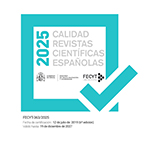Maternidades en tensión. Entre la maternidad hegemónica, otras maternidades y no-maternidades
Resumen
Este artículo propone repensar la “maternidad hegemónica” en las sociedades contemporáneas a partir de la emergencia de experiencias culturalmente descuidadas y políticamente desprotegidas como las “no-maternidades” u “otras maternidades”. Para ello, se plantea un análisis de las distintas interpretaciones que sitúan la maternidad en el centro del debate feminista y se enfatiza la presencia de aquellas figuras tradicionalmente periféricas. De este modo, en primer lugar, se traza una genealogía de la “maternidad hegemónica” en las sociedades occidentales a través de la producción intelectual de autoras clásicas feministas. En segundo lugar, desde diferentes aproximaciones antropológicas, se presenta la categoría de “otras maternidades” como experiencias que crean nuevas formas de parentesco y modelos de familia cuestionando así el ideal de la maternidad biológica y la familia bio-conyugal. En este sentido, se destaca la necesidad de desagregar la maternidad como vínculo aparentemente indisociable entre el material genético, el cuerpo gestante, la filiación y la crianza. En tercer lugar, se reflexiona sobre la categoría de “no-maternidades”, recurriendo a enfoques interdisciplinares que ponen de manifiesto la existencia de experiencias contrahegemónicas donde se expresan diversas formas de resistencia, transgresión o rebeldía, esto es, distintas formas de reivindicar la autonomía reproductiva, el tiempo propio y la creatividad. Así pues, en este artículo, a través del replanteamiento de la maternidad como categoría compleja, no vinculada en exclusiva a la experiencia biológica ni meramente como un mandato social, se ha pretendido realizar una aportación al debate sobre la “diversidad reproductiva”, subrayando el derecho de las mujeres a elegir sin presiones ni prejuicios.
Descargas
Descarga artículo
Licencia
La revista Investigaciones Feministas, para fomentar el intercambio global del conocimiento, facilita el acceso sin restricciones a sus contenidos desde el momento de su publicación en la presente edición electrónica, y por eso es una revista de acceso abierto. Los originales publicados en esta revista son propiedad de la Universidad Complutense de Madrid y es obligatorio citar su procedencia en cualquier reproducción total o parcial. Todos los contenidos se distribuyen bajo una licencia de uso y distribución Creative Commons Reconocimiento 4.0 (CC BY 4.0). Esta circunstancia ha de hacerse constar expresamente de esta forma cuando sea necesario. Puede consultar la versión informativa y el texto legal de la licencia.











